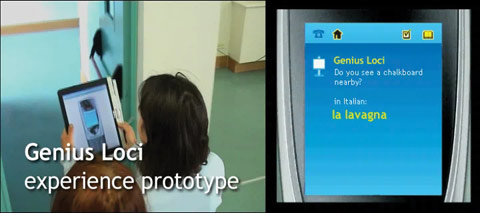-
As location-based information accumulates and overlaps, personalized filtering for topics of interest becomes vital. In this experience prototype, a database of location-based Italian-language information was built. Five adult students who were currently enrolled in an intermediate Italian class were given a Tablet PC containing custom-written Java and Macromedia Director applications. These applications interfaced an off-the-shelf wireless network positioning engine, called the Ekahau Positioning Engine.
The students were given the Tablet PC and asked to tour the building, looking for space tags which had been defined by the author. Their instructor accompanied them. Afterwards, they were given vocabulary tests of the items they encountered, and asked to complete a survey of the experience.
|
Streaming Video
View a 3 MB Quicktime streaming video.View a 7 MB Quicktime streaming video.
Experience Prototype Results
-
The students enjoyed the novelty of the device and the "treasure hunt" style of learning. One expressed a desire to be able to hear the words displayed. Other students agreed with this. Another student wished to read example sentences with the words.
The accuracy of the engine is not perfect or instantaneous, and this, combined with the limitations of the prototype, led to some frustrations among the users, who expected immediate response from the system and more control.
In the post-prototype questionnaires, the students remembered most of the words they encountered in English. They could only recall the Italian translations of the words less than 60% of the time, but no great emphasis was placed on the results.
The post-prototype questionnaires explained the differences between this experience and the experience of the actual service. When asked to imagine the service throughout Ivrea, all indicated that they would pay a small price on their monthly phone bill, as they felt it would be a positive aid to their Italian studies. Given control over the number of responses per day, they would request an average of four messages per day, specifically when they were mobile. The average acceptable maximum price for such a service was three euro per month.
| NEXT> Conclusion |
